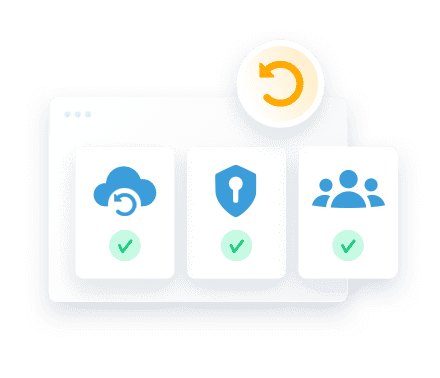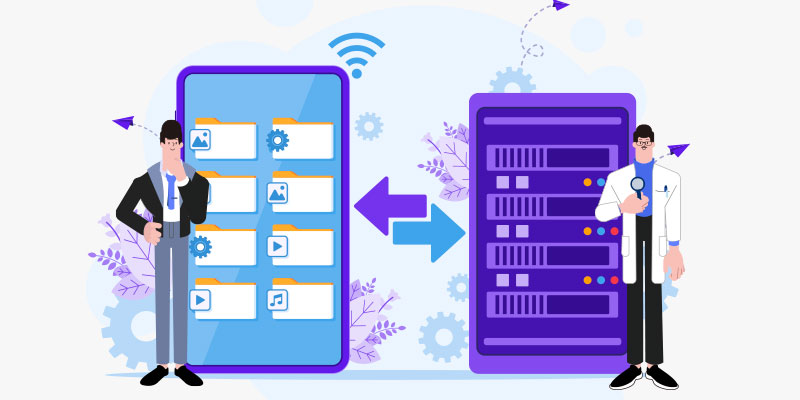Efficient Windows 10 Cloud Backup Ultimate Guide
Data has become essential to businesses in today's digital age. Losing any of this crucial information, including customer, financial, and operational data, can have dire repercussions. Small businesses require a dependable and secure backup solution that can effectively protect their data because of this. Small businesses can benefit greatly from cloud-based backup because it offers flexibility, scalability, and comfort.
- Understanding cloud-based backup
- Benefits of Small Business Cloud-based Backup
- Features of cloud-based backup solutions' security
- Picking the best Cloud-based Backup Service
- How to set up a Cloud-based Backup for Your small business
- Automated Backup vs. Manual Backup: Which is Better?
- Using cloud-based backup to reduce downtime
- Using a cloud-based backup to ensure data compliance
- Using a cloud-based backup to access and restore data
- Disaster Recovery Planning with Cloud-based Backup
- Comparing On-premise Backup Solutions to Cloud-based Backup
- Scalability and cost-effectiveness of cloud-based backup
- Getting rid of Common Problems With Cloud-based Backup Implementation
Understanding cloud-based backup
Next-gen Automated Backup Systems Best Practices

Advantages of Cloud-based Backup for Small Businesses
For small businesses, cloud-based backup offers a number of benefits. Data is continuously protected without manual intervention thanks to the automatic backups it offers. Additionally, cloud-based backup enables simple scalability, allowing you to expand your storage space as your company expands. Additionally, it lowers the price of hardware upgrade and maintenance.
Features of cloud-based backup solutions' security
To protect your data, dependable cloud-based backup solutions provide strong security features. To make sure that only authorized people can access it, these include encryption, both during transit and at rest. Multi-factor authentication is one example of an advanced authentication technique that adds a second layer of security. To ensure the integrity of the data, regular audits and compliance certifications are also required.
Fast Backup Solution For Personal Laptop In a Nutshell
Picking the best Cloud-based Backup Service
Consider elements like reputation, dependability, and customer support when choosing a cloud-based backup provider. Find providers who have a history of uptime and data protection. To comprehend their dedication to data recovery and restoration, evaluate their service level agreements ( Slas ). To find a solution that meets your company's needs, evaluate their pricing strategies and scalability options as well.
How to set up Cloud-based Backup for Your small business
The process of implementing cloud-based backup involves several steps. First, thoroughly evaluate your data storage needs and spot any important backup data. Next, select a reliable cloud-based backup service provider and work out an agreement. Set up backup plans and choose the right retention policies. To ensure data recoverability, keep an eye on and test your backups on a regular basis.
User-friendly Best Backup Software For Google Drive Recovery Tactics
Automated Backup vs. Manual Backup: Which is Better?

Automated backups provided by cloud-based backup systems are much more dependable than manual ones. Human error is eliminated by automated backups, which also guarantee consistent data protection without manual intervention. It reduces the likelihood of data loss brought on by forgetfulness or negligence while saving time and resources.
Using cloud-based backup to reduce downtime
The ability to minimize downtime during data loss events is one of cloud-based backup's key benefits. Businesses can quickly recover lost data and get back to business with regular backups stored in the cloud. As a result, productivity and customer satisfaction are reduced. The downtime will decrease as the data can be restored more quickly.
Comprehensive Offsite Backup Solutions For Small Business Customization Options
Using cloud-based backup to ensure data compliance
Depending on their industry and location, businesses must abide by a variety of data protection laws. By providing data encryption, access controls, and audit logs, cloud-based backup solutions can assist in achieving these compliance requirements. To avoid legal repercussions and safeguard sensitive customer information, it is essential to choose a provider who abides by pertinent industry standards.
Using a cloud-based backup to access and restore data (Cloud Storage Vs Cloud Backup)
Accessing and restoring data whenever necessary is simple thanks to cloud-based backup solutions. With an internet connection, authorized users can access files and folders from anywhere. Businesses can quickly recover their crucial data in the event of unintentional deletion, hardware failure, or cyberattacks thanks to the data restoration process, which is typically simple.
Cost-effective Zimbra Mail Server Disadvantages
Disaster Recovery Planning with Cloud-based Backup
Disaster recovery planning depends heavily on cloud-based backup. Businesses can safeguard their data from physical disasters like theft, fires, and floods by storing backups off-site in secure data centers. Businesses can quickly recover their crucial information and resume operations in the event of try this website a disaster thanks to the cloud-based backup.
Comparing cloud-based backup to on-premise backup solutions
Compared to conventional on-premise backup solutions, cloud-based backup has a number of advantages. Cloud-based backup eliminates the need for pricey hardware purchases and ongoing maintenance. Additionally, cloud-based backup offers more accessibility, scalability, and flexibility than on-premises backups, which are constrained by physical infrastructure.
Offsite Remote Backup Appliance Comparison
Scalability and cost-effectiveness of cloud-based backup
Businesses can scale up or down their storage capacity using cloud-based backup solutions because they are so scalable. It is a cost-effective solution because of its scalability, which guarantees that small businesses only pay for the storage they need. Additionally, cloud-based backup makes it unnecessary to spend money on It infrastructure or buy extra hardware.
Getting Past Common Obstacles in Cloud-based Backup Implementation
While cloud-based backup has many advantages, small businesses may find it difficult to implement. Large data volumes, potential bandwidth restrictions during peak hours, and the requirement for reliable internet connectivity all contribute to the slowness of initial backups. These difficulties, however, can be reduced by careful planning, monitoring, and backup provider selection.
Modern Backup As A Service Pricing Future Outlook
Important Notes:
Small businesses can benefit from flexibility, scalability, and peace of mind thanks to cloud-based backup.
- Data protection in cloud-based backup solutions requires security features like encryption and authentication.
For data protection, it is essential to pick a reputable and trustworthy cloud-based backup provider.
- Implementing cloud-based backup entails steps like monitoring, provider selection, configuration, and data assessment.
- Cloud-based solutions' automated backups are more dependable than manual ones.
- Cloud-based backup makes it easier to quickly restore data and reduces downtime during data loss events.
- Security measures for cloud-based backups can be used to comply with data protection regulations.
- Data can be easily accessed and restored from any location with an internet connection thanks to cloud-based backup.
Offsite backups provided by cloud-based solutions improve disaster recovery planning.
- Cost-effectiveness and scalability are advantages of cloud-based backup over on-premises solutions.
Businesses can only pay for the storage they require thanks to cloud-based backup's scaleability.
- With careful planning and picking the right provider, common obstacles to implementing cloud-based backup can be overcome.
Keep in mind that small businesses can suffer greatly from data loss. You can safeguard your sensitive data and guarantee business continuity with cloud-based backup.
Key Takeaways or a related term
- Cloud-based backup reduces the risk of loss and More Help ensures data protection.
- Cloud-based backup solutions are adaptable and scalable, and they help small businesses.
Data integrity is ensured by security features like encryption and authentication.
- For trustworthy cloud-based backup services, picking a reputable provider is crucial.
Data assessment, provider choice, and configuration are appropriate implementation steps.
- Automated backups save time and lower the chance of human error.
- Cloud-based backup makes it easier to restore data quickly and reduces downtime.
- With cloud-based backup, compliance with data protection regulations is possible.
Through cloud-based backup solutions, data can be easily accessed and restored.
- Cloud-based backup's offsite storage enhances disaster recovery planning.
In terms of cost and scalability, cloud-based backup offers advantages over on-premise solutions.
Scalability ensures cost-effectiveness in the implementation of cloud-based backups - Online Email Backup Service.
- With the right planning, difficulties like slow initial backups can be overcome.
- Successful cloud-based backup implementation depends on reliable internet connectivity.


